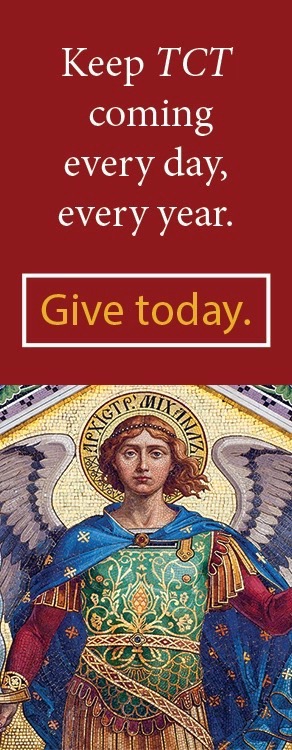Christmas is here. Or so the shopping malls, television ads, newspaper circulars, and radio waves would have us believe. Advent, the season of spiritual preparation for the birth of Christ, has long been swallowed up by the glitter and lights of “the Holiday Season,” which reaches its climax not with the Epiphany of the Lord on January 6, but with the Epiphany of a New Year. Consumer Christmas, lamented by believers for years, is not likely to relinquish its grip anytime soon.
But there is something we can do as individual believers both to prepare ourselves spiritually for Christmas and to fight the secular tide. It is a practice older than Christmas itself, a mandatory observance in centuries past, and a discipline recommended by our Lord himself: We can fast for Advent.
Fasting is a form of penance, which at first glance seems out of step in the season of hope. Yet it is the need for and the action of penance that prepares us for the coming of the Savior, who has come to save us from our sins. And He will not save us unless we first repent –acknowledge our sins and our need to be forgiven – and then manifest our repentance through acts of penance: prayer, fasting, and almsgiving.
Prayer and almsgiving are still rightly associated with Christmas, the season of giving. But fasting in the month of December, as the sermons of Pope Leo the Great (reigned 440-461) show, is a practice once encouraged of the faithful.
“What is more effective,” Leo proclaimed one December, “than fasting, by which we approach God, and, resisting the devil, we overcome indulgent vices. For fasting has always been food for virtue: chaste thoughts, reasonable desires, and more sound deliberations profit from fasting. And through these voluntary afflictions, our flesh dies to concupiscence and our spirit is renewed for moral excellence.”
Fasting, by depriving us of worldly goods, sharpens our efforts at combatting sin and acting charitably. But we see from Leo’s exhortation that fasting and the spirit that comes with it, far from turning Advent into a shorter Lent, help us resist the temptation of reducing Advent into an extended shopping spree. From fasting, we receive the grace to gaze upon the manger instead of ritzy displays, the shepherds instead of models, the Magi instead of Macy’s.

Of course, combatting sin is never out of season, and the Sunday Mass readings for the first half of Advent point us in this direction. The first Sunday of Advent is not directed toward the advent at Bethlehem, but at the end of the world when Christ will return as our judge: “Take heed, watch and pray; for you do not know when the time will come.” (Mark 13:33) The second Sunday introduces St. John the Baptist, the gateway to the Nativity, who bids us to prepare our hearts for the Lord by accepting “a baptism of repentance for the forgiveness of sins.” (Mark 1:4) For the Baptist, there can be no Christmas without prior penance.
Fasting produces in us one further effect that is not often discussed, and it is one that points to the essence of Advent – longing. When we fast, our bodies clamor for what we have willingly forsaken, be it food, comfort, entertainment, or other goods. Rather than respond with indulgence, we can respond with prayer: “Lord, hasten to fill the emptiness within me this Christmas, as I know only you can fully satisfy the longings of my soul.” With an empty stomach and an expectant heart, the age-old prayer of Israel – O come, O come, Emmanuel –rings with new poignancy and vigor.
Consumer Christmas would have us believe that our longings can be satiated with the latest gift item or fashion trend. But fasting’s discomfort reminds us that satisfaction from material goods is fleeting; only God, the source and end of all regular desires, can truly satisfy. Hence fasting can fortify us to perform the necessary material preparations for Christmas –shopping, baking, decorating, card writing, wrapping, cooking – in a spirit that looks beyond the trimmings to their ultimate purpose: the great celebration of God coming to live among us. Even children, teeming with excitement over coming gifts and arrivals, can be reminded of the real Gift who comes at Christmas simply from encouragement to give up one small thing during Advent.
In the same sermon, Pope Leo adds that “since salvation of our souls is brought about not only by fasting, let us add works of mercy for the poor to our fasting. . . .so that whoever from his just labors offers a sacrifice of piety to God, the author of all goods, he may merit to receive from them the reward of the heavenly kingdom.”
This Advent, as we add fasting to our prayer and almsgiving, may we also merit to receive the same reward, found not in a store or catalogue, but away in a manger.
















